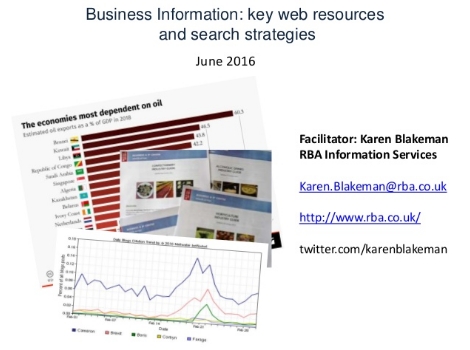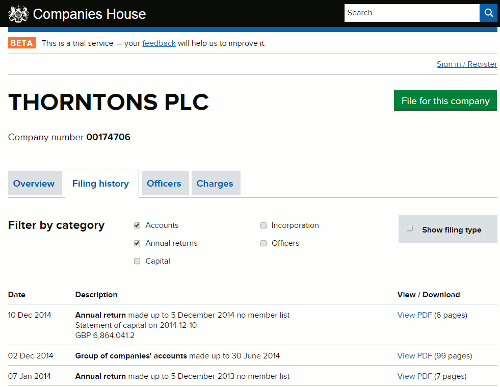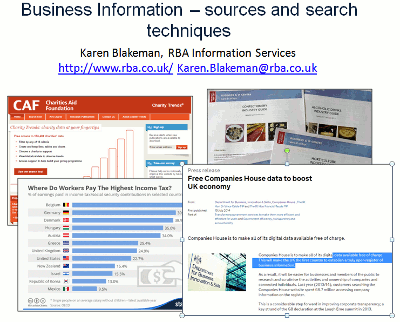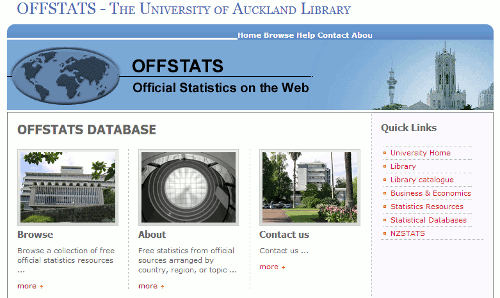Some of the slides that I used as part of my June 2016 workshops on Business Information are now available on both SlideShare and authorSTREAM. The workshop run in the last week of June inevitably included a session on the EU referendum and the Brexit result. A few of those extra slides are included in this edited version of the presentation.
Category Archives: Business Information
Small companies now allowed to be bigger … or smaller
One of the services I provide is company research including official registry documents and accounts. Many registries, including, the UK’s Companies House, make a significant amount of their data available free of charge. Some still charge for documents and a few insist that you register before you can even search for a company. If I know the information is freely available I usually point the client at the relevant website but a few people come back to me when they discover that the interface is in a foreign language. If registration and/or payment are required I’m often asked to search on the client’s behalf because they just do not want the hassle of going through the registration process and recouping the cost of a small overseas transaction from their accounts department.
Regardless of whether the information is free or charged for, I often receive what I call a second stage request for more detailed accounts. Why is there no Profit & Loss? Where is the revenue/turnover figure? I then have to explain how the reporting and filing requirements differ depending on the country, or even state; and then I have the joy of taking the client through small company exemptions. Some people I know have only just got their head around the changes introduced by UK Companies Act 2006. I now have to tell them that this has changed yet again.
In March 2015 the UK Government approved new regulations that implement the requirements of the new EU Accounting Directive. The changes came into effect in the UK from 1 January 2016. There are a number of changes, which may reduce yet further the amount of information that small companies are required to provide, and there are also changes to what is deemed to a be a “small” company. Small companies can now be bigger.
A company can now qualify as small if meets at least two of the three following criteria:
- turnover not more than £10.2m (previously £6.5m)
- balance sheet total not more than £5.1m (previously £3.26m)
- average number of employees not more than 50 (no change)
Information on some of the other changes can be found on the Companies House Blog – Changes to accounting standards and regulations. The key ones are:
“… the removal of the ability for a small or medium-sized company to file abbreviated accounts with us at Companies House. A company will now be required to file the accounts they prepare for their members at Companies House (although a small company or micro-entity will usually be able to choose not to file their profit and loss account or director’s report).”
“However, this does not mean that all small companies are now required to file full accounts, the very smallest companies may disclose less information by preparing micro-entity accounts. Other small companies may, instead of filing full accounts, choose to prepare a set of abridged accounts for their members and then file these with us.”
So, as well as “small” being allowed to be bigger we now have even smaller companies or “micro-entities” who can choose to disclose less information. The whole thing is beginning to look as clear as mud!
The ICAEW has a useful overview of what is happening at The revised UK small companies regime but if you want to keep up with the latest updates then follow the Companies House Blog.
Business information key resources and search strategies – Top 10
The participants of the business information workshop I ran on March 8th had a variety of interests: search strategies and commands for Google et al, UK government information, statistics, open data, social media, companies, locating scientific research. So it was quite tough limiting the Top Tips that I asked them to nominate at the end of the day to just 10.
This is what they came up with.
- Get to know the key resources and starting points for different types of business information e.g. Companies House, OFFSTATS and go direct to those rather than Google. It will save you time in the long run.
- Verbatim. An invaluable tool for research when Google insists on rewriting your search and dropping terms. To make Google search for all of your terms without variation, but in any order, first run your search. Then click on ‘Search tools’ in the line of options above your results. In the second line of options that appears click on ‘All results’ and from the drop down menu select Verbatim. If you are carrying out in-depth research it is worth using Verbatim even if your “normal” Google results seem to be OK. You may see very different content in the Verbatim list.
- Combine advanced search commands such as site: and filteype: to focus your search on types of information (PDF reports, PPT presentations, spreadsheets containing data) and websites (government, academic, individual sites). Also try using the minus sign to exclude documents containing specific terms or sites that are irrelevant.
- Phil Bradley’s UK Newspapers Google Custom Search Engine. http://www.philb.com/nationaluknewspapers.html
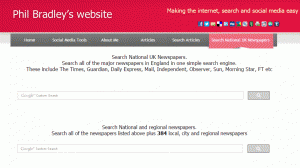
A relatively new tool that enables you to search all of the major national UK newspapers and regional newspapers. A real time saver if you are searching for local information on a local business or entrepreneur and don’t want to have to track down all the local papers and search them one by one. - OFFSTATS – The University of Auckland Library http://www.offstats.auckland.ac.nz/ A good starting point for official statistical sources by country, region subject or combination of categories. All of the content in the database has been chosen and quality assessed by staff at The University of Auckland Library.
- Zanran http://zanran.com/ A tool for searching information contained in charts, graphs and tables of data. Enter your search terms and optionally limit your search by date and/or format type. Zanran comes up with a list of documents that match your criteria with thumbnails to the left of each entry. Hover over the thumbnail to see a preview of the page containing your data and further information on the document.
- Advanced Twitter Search. http://twitter.com/search-advanced Essential tool if you are using Twitter to look for news on product developments, announcements, conferences, discussions on technologies/companies, or how companies interact with customers.
- Wayback Machine http://www.archive.org/ Want to see what was on a website a few years ago or trying to track down a document that seems to have vanished from the web? Try the Internet Archive Wayback Machine at http://www.archive.org/. Enter the URL of the website or document and you should then see a calendar of the snapshots that the archive has. Choose a date from the calendar to view the page. The archive does not have everything but it is worth a try. See also the UK National Archives of old government websites and pages at http://www.nationalarchives.gov.uk/webarchive/
- OUsefulInfo, http://blog.ouseful.info/ “Trying to find useful things to do with emerging technologies in open education and data journalism”. Maintained by Tony Hirst, this blog has useful information and descriptions of what can be involved when dealing with and manipulating open data.
- DuckDuckGo http://duckduckgo.com/ This was not covered in the workshop but one of the participants recommended it as a useful alternative to Google. Aside from the absence of tracking and personalisation it provides different and a greater variety of results when compared with Google.
Edited highlights of the workshop slides can be found on authorSTREAM and Slideshare.
My next business information related workshop is Discover Open Data on the 7th April. The next advanced Google workshop (New Google, New Challenges) is on the 13th April and the Essential non-Google search tools is on the 12th April.
Business information resources and search strategies
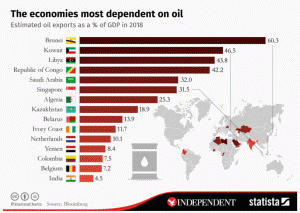 I’ve finally finished “updating” my slides and notes for the first of this year’s workshops on business information, which takes place next week. It was not so much an update, more a rewrite. With all the changes at Google, UK government website transfers and disappearances, the “right to be forgotten” and the many website design changes by business resources to make them mobile friendly I was virtually starting from scratch.
I’ve finally finished “updating” my slides and notes for the first of this year’s workshops on business information, which takes place next week. It was not so much an update, more a rewrite. With all the changes at Google, UK government website transfers and disappearances, the “right to be forgotten” and the many website design changes by business resources to make them mobile friendly I was virtually starting from scratch.
Next week’s workshop is being organised by TFPL in central London on Tuesday 8th March. TFPL have made the event the “Course of the Week” and reduced the price to £249, but you have to book by midnight on Friday 4th March to get the reduced price.
The topics I shall be covering include:
How the legal and regulatory environment is affecting search and the provision of information
Starting points, evaluated listings and government sources
Company information: share prices, financials, official data
Statistics, market and industry data, open data
News sources and alerting services
Essential search techniques for tracking down business information
How to use social media and professional networks for business intelligence
Where to find older, archived material
As usual, there will be practical sessions for people to try out resources and search techniques for themselves. If you are interested go to the TFPL website or contact their learning time on 020 7378 5477.
UK company information now free of charge
A year ago Companies House announced that they were going to make all of their company information available free of charge to everyone. The press release was short on detail and many of us wondered what format the data would be in and how easy it would be to use. Daily files containing accounts data registered on the previous day were already available but these are huge zip files that, when unpacked, contain files with meaningless names. (http://download.companieshouse.gov.uk/en_accountsdata.html). Unless you have software that can manage and search the data it is impossible to identify which files contain information on the company you are researching. 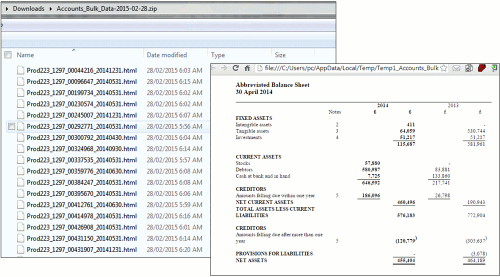
For most of us the files are useless. Was this to be the format of the free service? Thankfully, no.
A new beta service at http://beta.companieshouse.gov.uk/ now enables you to search for companies by name or number and obtain free of charge:
- Company overviews
- Current and resigned officers
- Document images
- Mortgage charge data
- Previous company names
- Insolvency data
For the officers you can see what other companies they are involved with. What you cannot do at the moment is search by director name from the start. That is a “planned feature” as are disqualified directors search, company monitoring, company name availability, dissolved companies and overseas data. For those options you have to revert to the old WebCHeck service at http://wck2.companieshouse.gov.uk/.
The new beta service is easy to use and at last we have access to UK company documents and accounts free of charge. So, does this mean the end of services such as Company Check (http://companycheck.co.uk/) and DueDil (http://www.duedil.com/)? Not necessarily. Company Check, for example, already has an option for searching by director name and there are also useful charting, monitoring and structure options as well as access to some European companies. They also offer access to risk scores, credit reports and County Court Judgments (all priced). All of these services only allow you to search for companies one at a time: there is no multi-criteria search that you can use to find companies by turnover, number of employees, industry sector for example. Neither can you compare companies or conduct a detailed peer group analysis. For that you still have to use priced services such as BvD (http://www.bvdinfo.com/)
Overall, a move in the right direction and ideal if your needs are simple, for example accounts and director information for a live company. But look carefully at what features are available before you cancel your subscription service.
Business information – sources and search techniques
I am running my full day business information, sources and search techniques workshop for the Commercial, Legal and Scientific Information Group (CLSIG).
Date: Thursday, 16 July 2015, 9:30am to 4:30pm
Venue: CILIP, 7 Ridgmount Street, WC1E 7AE London . See map: Google Maps
Cost: CLSIG/CILIP Members £85; Non-members £100; Concessions £50
Contact for bookings: Marie.cannon@nortonrosefulbright.com
For further details of the workshop content contact karen.blakeman@rba.co.uk
Search engines, government and official information sources, and the EU regulatory environment are continually changing. All of these affect how we search and the information that is presented to us. In some cases information may be deliberately excluded from our results. This one day workshop will look at what’s new, key resources for business and official information, and how to use search tools to ensure you are picking up everything that you need. There will be time for practical sessions so that you can try some of the exercises provided, or experiment with your own searches. Lunch and refreshments are included.
Topics covered include:
- effect of EU legislation on research and due diligence
- increase in official open data – accessibility, quality, usability
- changes to Google and other search tools, and their impact on research
- starting points, evaluated listings and government sources
- company information: official sources; free open data sources worldwide; companies that repackage official company information – pros and cons
- news sources and alerting services
- the value of social media and professional networks for business intelligence
- statistics, market and industry data
Please email Marie Cannon to book your place (Marie.cannon@nortonrosefulbright.com)
More UK information vanishes into GOV.UK
Just when you’ve finally worked out how to search some of the key UK government web resources they disappear into the black hole that is GOV.UK.
The statistics publication hub went over a few weeks ago and the link http://www.statistics.gov.uk/ now redirects to http://www.gov.uk/government/statistics/announcements. Similarly, Companies House is now to be found at http://www.gov.uk/government/organisations/companies-house and the Land Registry is at http://www.gov.uk/government/organisations/land-registry. Most of the essential data, such as company information and ownership of properties, can still be found via GOV.UK and in fact some remains in databases on the original websites. For example, following the links on GOV.UK for information on a company eventually leads you to the familiar WebCHeck service at http://wck2.companieshouse.gov.uk/. Companies House useful list of overseas registries, however, seems to have totally disappeared but is in fact hidden in a general section covering all government “publications” (http://www.gov.uk/government/publications/overseas-registries#reg).
Documents may no longer be directly accessible from the new departmental home pages so a different approach is needed if you are conducting in-depth research. GOV.UK is fine for finding out how to renew your car tax or book your driving theory test – two of the most popular searches at the moment – but its search engine is woefully inadequate when it comes to locating detailed technical reports or background papers. Using Google’s or Bing’s site command to search GOV.UK is the only way to track them down quickly, for example biofuels public transport site:www.gov.uk. Note that you need to include the ‘www’ in the site command as site:gov.uk would also pick up articles published on local government websites. This assumes, though, that the document you are seeking has been transferred over to GOV.UK.
There have been complaints from researchers, including myself, that an increasing number of valuable documents and research papers have gone AWOL as more departments and agencies are assimilated Borg-like by GOV.UK. Some of the older material has been moved to the UK Government Web Archive at http://www.nationalarchives.gov.uk/webarchive/.
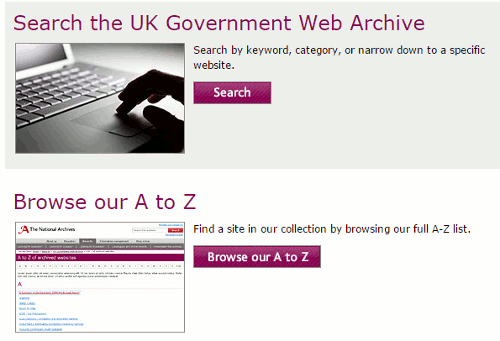
This offers you various options including an A-Z of topics and departments and a search by keyword, category or website. The latter is slow and clunky with a tendency to keel over when presented with complex queries. I have spent hours attempting to refine my search and wading through page after page of results only to find that the article I need is not there, nor anywhere else, which is an experience several of my colleagues have had. This has led to conspiracy theories suggesting that the move to GOV.UK has provided a golden opportunity to “lose” documents.
I am reminded of a scene from Yes Minister:
James Hacker: [reads memo] This file contains the complete set of papers, except for a number of secret documents, a few others which are part of still active files, some correspondence lost in the floods of 1967…
James Hacker: Was 1967 a particularly bad winter?
Sir Humphrey Appleby: No, a marvellous winter. We lost no end of embarrassing files.
James Hacker: [reads] Some records which went astray in the move to London and others when the War Office was incorporated in the Ministry of Defence, and the normal withdrawal of papers whose publication could give grounds for an action for libel or breach of confidence or cause embarrassment to friendly governments.
James Hacker: That’s pretty comprehensive. How many does that normally leave for them to look at?
James Hacker: How many does it actually leave? About a hundred?… Fifty?… Ten?… Five?… Four?… Three?… Two?… One?… *Zero?*
Sir Humphrey Appleby: Yes, Minister.
From “Yes Minister” The Skeleton in the Cupboard (TV Episode 1982) – Quotes – IMDb http://www.imdb.com/title/tt0751825/quotes
For “floods of 1967” substitute “transfer of files to GOV.UK”.
Business information key resources
On one of my recent workshops I was asked if I used Google as my default search tool, especially when conducting business research. The short answer is “It depends”. The long answer is that it depends on the topic and type of information I am looking for. Yes, I do use Google a lot but if I need to make sure that I have covered as many sources as possible I also use Google alternatives such as Bing, Millionshort, Blekko etc. On the other hand and depending on the type of information I require I may ignore Google and its ilk altogether and go straight to one or more of the specialist websites and databases.
Here are just a few of the free and pay-per-view resources that I use.
Information on industry sectors
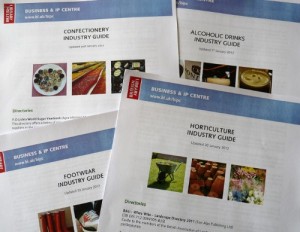 My favourite collection of guides on industry sectors is The British Library Business Information and IP Centre’s industry guides. These highlight relevant industry directories, databases, publications and web sites and are excellent starting points if you are new to a sector
My favourite collection of guides on industry sectors is The British Library Business Information and IP Centre’s industry guides. These highlight relevant industry directories, databases, publications and web sites and are excellent starting points if you are new to a sector
Statistics
There are at least a dozen statistics sites that I use on a regular basis but if I’m unsure of where to look or want to make sure I haven’t missed anything I use OFFSTATS – Official Statistics on the Web at http://www.offstats.auckland.ac.nz. A great starting point for official statistical sources by country, region subject or a combination of categories. All of the content in the database is in the public domain and available through the Internet and has been quality assessed by staff at The University of Auckland Library.
Official company information
If I want to confirm the existence of a company or obtain filings and accounts I usually go direct to the relevant official company registry. I have a list of the registries that can be searched online at http://www.rba.co.uk/sources/registers.htm. As many of my enquiries are for UK companies I am a frequent visitor to Companies House at http://www.companieshouse.gov.uk/. Some information is free but filings and accounts are priced. There are several companies that repackage Companies House data and sometimes make extra data or analysis free of charge for example Company Check at http://www.companycheck.co.uk/, which enables you to search by company or director’s name. Risk reports, information on CCJs, and some official filings are priced if you do not have a subscription to the full service.
Share price information
For free share price information I use Yahoo Finance (http://uk.finance.yahoo.com/) and Google Finance (https://www.google.co.uk/finance). Both of these services provide charts and news on shares on the major stock markets. Google’s graphs are ‘annotated’ with labels that link to news articles listed to the right of the graph, so you can see whether or not a particular event or announcement has affected a share price. Both offer free, daily historical share prices in figures. As well viewing historical graphs for share prices you can download the data as a spreadsheet.
News alerts
For news alerts I use a mixture of bookmarked searches, Google email and RSS alerts, and RSS feeds from a wide range of blogs and news sites. I find that Google alerts are erratic and unreliable but they do sometimes pick up something unique so I still include them in the mix. RSS feeds are my main source of current awareness and when a news feed is rather broad in coverage I use my RSS reader’s search function to identify the articles that are of interest to me. I use a desktop reader call RSSOwl (http://www.rssowl.org/) but Inoreader (http://inoreader.com/) is a web based service that offers similar features and options.
Who is behind a site?
If I am to use any information from the web for business purposes I need to know who is behind the website. DomainTools http://www.domaintools.com/ is one of many services that will tell who owns a domain name, unless they are hiding behind an agent or privacy protection service. There is also a Whois+ extension for Chrome (my default browser) that can be used to run a quick and easy check on the domain name of a displayed page.
Workshop
If you are interested in finding out more about business information resources I am running a workshop for TFPL in London on March 6th , June 6th 2014. Details are on the TFPL website.
Update: please note change of date for the next business information workshop. It is now being held on June 6th, 2014.
Top tips from the latest business information workshop
Delegates at yesterday’s business information workshop in London came up with an interesting combination of websites and search commands for their end of day top tips.
- OFFSTATS – Official Statistics on the Web http://www.offstats.auckland.ac.nz Excellent starting point for official statistical sources by country, region subject or a combination of categories. All of the content in the database is in the public domain and available through the Internet.
- GMacker http://gmacker.com/web/content/gDateRange/gdr.htm Google’s Verbatim in the search options menu on the results page is great. Google’s date option from the same menu is great. But you cannot use both together. You can use the daterange: command, though, with Verbatim but it’s complicated. GMacker is a much easier way to do it. Type in your search on the GMacker page, select your dates from the calendars and click on ‘Google Search’. When the results appear on Google simply apply Verbatim in the usual way.
- Domain Tools http://www.domaintools.com/ A useful tool for identifying who owns the domain name of a website.
- 7 side http://www.7side.co.uk/ was recommended for its International company information services.
- Zanran http://zanran.com/This is a search tool for searching information contained in charts, graphs and tables of data and within formatted documents such as PDFs, Excel spreadsheets and images. Enter your search terms and optionally limit your search by date and/or format type.
- News alerts, news curation services and automated newsletter generation. Use Google alerts, RSS feeds and newsletter generation sites such as Paper.li (http://paper.li/) and Scoop.it (http://www.scoop.it/) to keep up to date and share news with colleagues.
- site: command Use the site: command to focus your search on particular types of site, for example site:ac.uk, or to search inside a large rambling site. You can also use -site: to exclude sites from your search.
- Numeric range This command is unique to Google. Use it for anything to do with numbers – years, temperatures, weights, distances, prices etc. Simply type in your two numbers separated by two full stops as part of your search. A good way of limiting your search to pages or news covering a company’s activities over two or three years in the past.
- OpenCorporates “The Open Database Of The Corporate World” http://opencorporates.com/ Provides access to open corporate data on 55 million companies in 75 jurisdictions. You can search all jurisdictions at the same time or select just one. Results can be filtered by type of data held, current status, company type, SIC. A link to the original registry page for a company is always included with the displayed information.
- DataMarket http://datamarket.com/ A portal to thousands of free and priced datasets. Free to search, and create charts and visualisations of the free data.
Does price guarantee quality of information?
I recently co-presented a webinar on researching legal information. The event was organised by TFPL, and Alan Blanchard and myself reviewed free and paid for resources together with key search techniques.
Throughout the session we polled the audience on a number of issues, the first question being “Does price guarantee quality when you are purchasing information?”. Surprisingly, given the topic of the webinar, 70% voted ‘No’ with the remaining 30% opting for ‘I don’t know’ rather than ‘Yes’. When we asked about their opinions on free information, though, 79% said they would need a result from a free source to be validated with a paid resource.
The audience could not qualify their answers – it was a simple yes/no/don’t know – but there were some interesting discussions on the issues after the event. The priced services certainly have to work hard to prove value for money and they cannot assume that their users will automatically renew each year. Free information has a big part to play in legal and business research but it is vital that one is aware of the limitations of free. For example, do you know how up to date legislation.gov.uk is and if it carries revised legislation? (See http://www.legislation.gov.uk/help#aboutRevDate for the answer). And then there is the issue of making Google run your search the way you want it run, without personalisation or deviation.
I am running two public access workshops this autumn for TFPL that look at free versus fee resources for business and legal information. The first, on 19th September 2013, is Business information: key web resources and covers:
- Portals and key starting points
- Company information
- Industry information
- Official statistics, market research
- News sources, RSS and alerting services
- Social media and professional networks
The second is Free resources and search techniques for EU and UK legislation and is on 13th November 2013. It will be looking at:
- How to use advanced search commands to find news and information on legislation
- How to use reading level and date ranges to focus the search
- Searching foreign language pages
- Options for searching journals, research information, grey literature
- Alternatives to Google, specialist tools and sites
- Assessing quality and relevance
Both days include practical sessions and places on the workshops are limited. Contact TFPL for further information and bookings.
